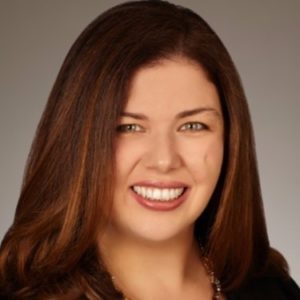The images on TV and the articles in newspapers detailed how federal agents forcibly separated children from the arms of their mothers and fathers who came to the U.S. from Honduras, El Salvador and Guatemala where they faced brutal beatings, torture and murderous gangs.
For Anne Brooksher-Yen, senior associate general counsel at Irving-based Celanese Corporation and mother of two small kids, the reports and videos were excruciating.
“It was so personal because I knew the only thing that separated me from them was the place of my birth and my education,” she says. “It was just so horrible to watch. But I am so proud of how the legal profession has stepped forward.”

Brooksher-Yen went to her general counsel and CEO to get permission to take on an asylum case pro bono. Her bosses not only said yes, they asked what else the company could do to help.
Six lawyers at Celanese, which is a global technology and specialty materials maker, are now involved in representing eight asylum cases, including helping review case files, writing and editing briefs, providing translators and overall legal strategy.
Brooksher-Yen’s concern spread throughout the company, as employees started coming together to offer assistance.
“Different groups within Celanese adopted families and provided food, books for school, soap and other supplies,” she says. “It was basically a starter or welcome to America package. Remember, these folks come across the border with nothing. They are prohibited by U.S. law from getting jobs or working, so little things such as eating can be problematic.”
The Association of Corporate Counsel’s DFW Chapter and The Texas Lawbook are pleased to announce that Brooksher-Yen is a finalist for the 2018 Outstanding Corporate Counsel’s Pro Bono and Public Service Award. The winners will be announced Thursday, Jan. 24, at the George W. Bush Institute.
“It is unusual for a company to provide pro bono assistance on this scale,” says Debbie McComas, a partner at Haynes and Boone. The firm nominated Brooksher-Yen for the award. “It starts with the Celanese legal department, which saw a need and was able to get the entire company involved in helping. Our clients face profound challenges that we would not have been able to fully address without Celanese’s assistance.”
Brooksher-Yen was born in Southern California, but grew up in southern Arizona just a stone’s throw from the Mexico border.
“We used to go into Mexico all the time for lunch and didn’t think a thing about it,” she says. “My mother was a disenchanted lawyer who took a crash course on journalism and became a reporter and taught contract law at a local law school.”
Brooksher-Yen’s father was a plastic surgeon who specialized in cleft reconstructive surgery. He could have earned multiple times more money practicing in Los Angeles, but instead chose to live in rural Arizona.
“My dad believed that everyone deserved dignity and respect, no matter their background,” she says.
After earning a bachelor’s degree in literature at Arizona State University, Brooksher-Yen went to law school at NYU, where she graduated in 2006.
Brooksher-Yen worked three years in the litigation section at DLA Piper and then five years at Winston & Strawn and two years at Arnold & Porter, where she spent much of her time representing the tobacco companies dealing with the so-called “Master Settlement Agreement” that they signed with the state attorneys general in 1998.
The job required a lot of travel, and Brooksher-Yen, who had two children, looked for a position with less brutal travel demands. In August 2016, Celanese flew her to Dallas, where it was 103 degrees when she landed.
“Everyone complained about how hot it was, but I pointed out that it was 115 back in my hometown in Arizona,” she says. “I did the interview from 8 a.m. until 3 p.m., and then caught a flight home. I had a job offer when I landed. I was shocked that it was so fast, but I liked it, too.”
For the past two years, she has been head of global litigation and environmental health and safety.
Brooksher-Yen has a history of pro bono. In 2013, she helped represent a U.S. Marine who served from 1952 to 1955, but was dishonorably discharged because he was gay.
“The soldier had cancer and was in critically ill health and in hospice and he simply wanted his status changed to honorably discharged,” she says. “It was simply a matter of personal honor. He had served his country and he wanted that peace. He died a week after his status was legally changed.
“There is this underlying current of human dignity that is involved in so many of these pro bono cases,” she says. “When there are legal injustices, lawyers need to step up and do something. We are fortunate to work at a company that supports this type of outreach, from the board of directors and CEO on down.”
